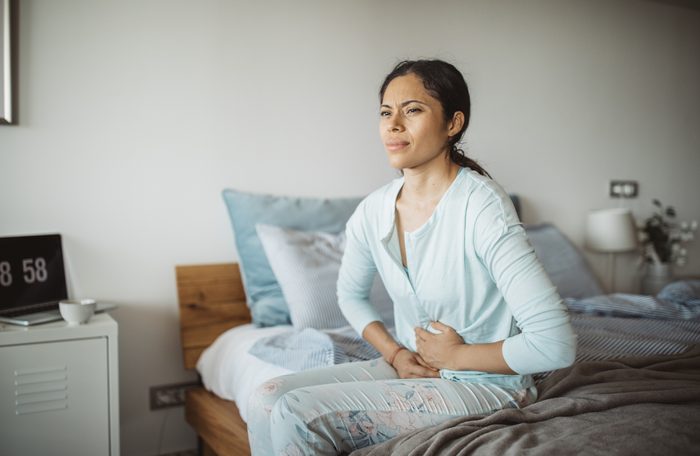
What is a stomach ulcer?
Peptic ulcers are painful sores that line the stomach—and they affect about 4.5 million people per year. Normally the stomach has a protective layer that keeps the acidic juices in the stomach from getting to sensitive tissue and causing an ulcer. However, some people are at risk for developing stomach ulcers, most often due to long-term use of NSAIDs, the class of pain reliever that includes ibuprofen or aspirin, or an infection with a type of bacteria called H. pylori. The good news is that treatment can help many ulcers to heal. Here are the signs of an ulcer you shouldn’t ignore.

You have pain specifically in your upper abdomen
One of the most common ulcer symptoms is severe pain in the upper abdomen, according to Neil Sengupta, MD, a gastroenterology specialist at the University of Chicago, Illinois. Ulcers can develop anywhere in the upper digestive tract, says Dr. Sengupta, but we often think about those occurring in the stomach or small intestine, where we feel pain. This ulcer pain usually occurs when your stomach is empty and can come and go for as long as several months, according to the National Institute of Diabetes and Digestive and Kidney Diseases. Find out what other types of stomach pains might mean.

You feel nauseous
One of the other telltale ulcer symptoms is feeling nauseous, Dr. Sengupta says. Many patients report that having a little food in your stomach can help ulcer symptoms subside. (Here are some other home remedies for an upset stomach you can try.)
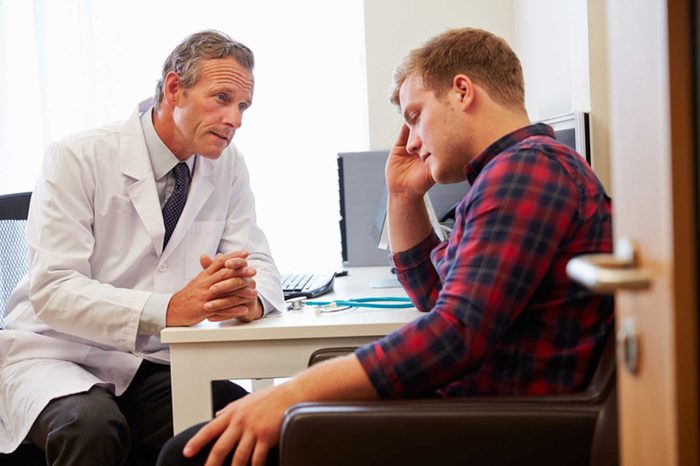
You’ve had unexplained vomiting
From time to time, nausea brought on by ulcers may become so intense that it could actually cause you to vomit. If that happens, stay away from medications like ibuprofen and aspirin. According to Dr. Sengupta, these over-the-counter pain medications actually put you at a higher risk of developing ulcers—or make your current ulcers worse.

You bleed when you use the bathroom
Blood coming from the gastrointestinal tract can signal a variety of underlying health issues. Still, Dr. Sengupta says when this bleeding is combined with upper abdominal pain, he’s “highly suspicious” that it’s one of the signs of an ulcer. Many patients notice this blood either when vomiting, or when using the bathroom, as their stools may appear black. If you notice this blood, along with nausea and pain in the stomach or chest, Dr. Sengupta says doctors will often perform a blood test and an upper endoscopy—where they use a camera to look into the stomach itself—to check if an ulcer is the culprit. According to NKIDD, blood in your stool can also be due to hemorrhoids, or be a symptom of colitis or colon cancer, so it’s a good idea to get checked out by your doctor. (Don’t miss these other signs of colon cancer you might be missing.)
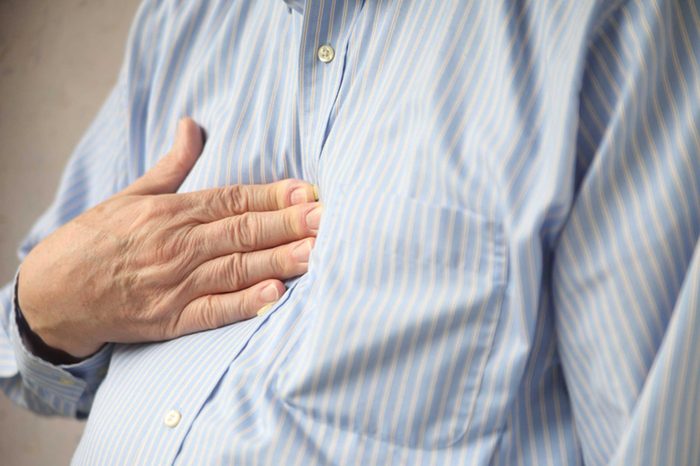
You have chest pain
Some patients with ulcers describe chest pain, a term called “non-cardiac chest pain,” which refers to pain in the area that’s not caused by a heart attack or heart disease, according to the American College of Gastroenterology. The discomfort is commonly caused by a GI problem, though it can also stem from stress or anxiety. Here’s what else chest pain on the left side could mean.
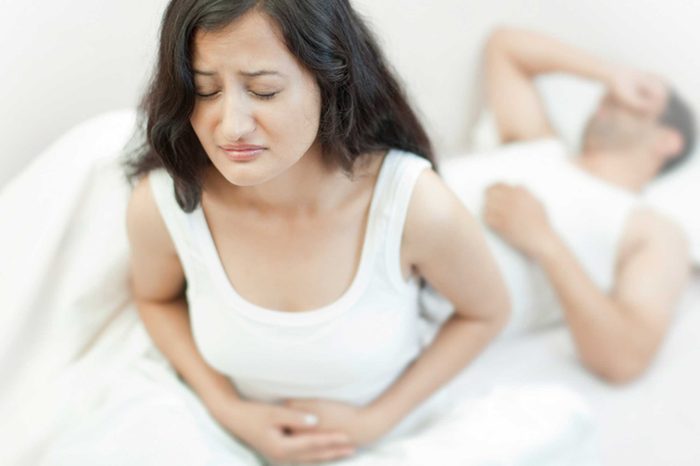
You’re more bloated than usual
If you notice your stomach feeling particularly bloated, it may be more serious than a little bit of gas—it could be one of the signs of an ulcer. Of course, bloating can also be caused simply by eating something your body doesn’t agree with, but when combined with these other symptoms, it’s worth checking out. Find out how to tell if you should worry about your belly bloat.
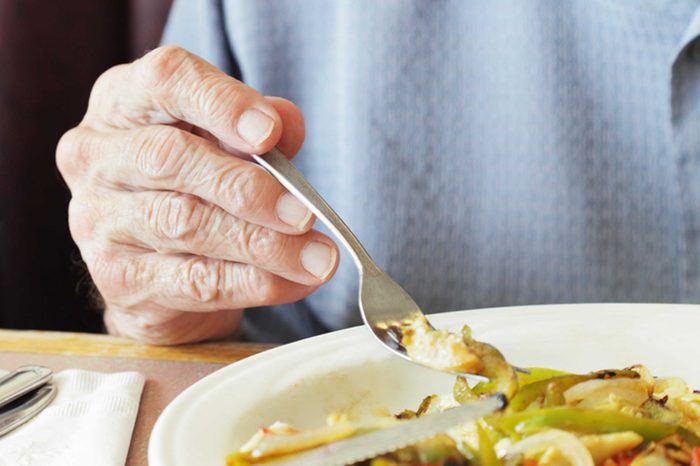
Your appetite went MIA
Another less common, but possible, ulcer symptom is weight loss. You may notice your appetite is off, and stomach discomfort makes it hard to eat. This drop in food intake, combined with occasional vomiting, may lead to unexpected weight loss. Don’t miss these other serious health conditions that cause unexpected weight loss.

You’re feeling weirdly hungry
You’d think that an ulcer would kill your appetite, but some people feel this burning or gnawing sensation in their stomach weirdly as hunger. The pain may briefly stop after you’ve had something to eat. Don’t miss these other medical reasons you can’t stop eating.
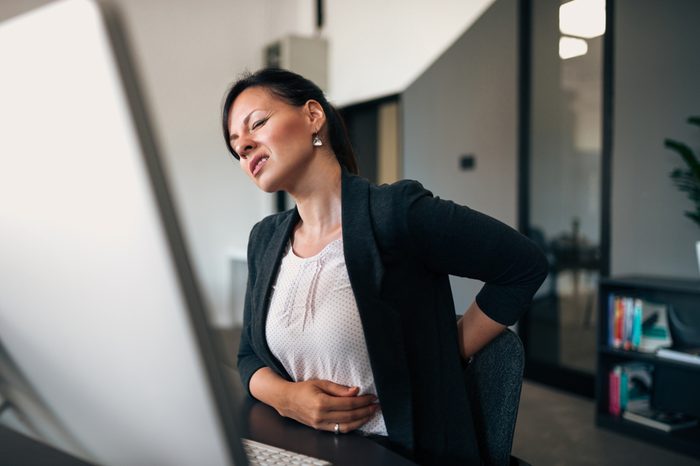
You’ve had back pain
You might associate ulcers with the stomach and small intestine, but believe it or not, some people report that the pain travels into their upper or mid-back. If that happens, it can make your symptoms all the more confusing. (Find out what to do if you wake up with back pain.)

You keep burping
Belching is a less common symptom of an ulcer, but your doctor might be suspicious of one if it’s accompanied by the others on this list. Talk to your doctor if you’ve been burping more than usual; ulcer or not, it can be a disruptive symptom and your doctor will want to figure out the cause. Find out how to tell if your symptoms are one of the signs of ulcerative colitis.
